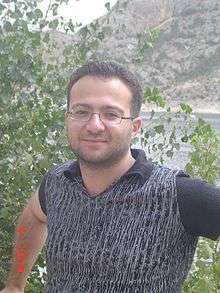Michael Segal
Michael Segal (Hebrew: מיכאל סגל; Russian: Михаил Сегал, born 1972 in Kishinev, USSR) is a Professor of Communication Systems Engineering at Ben-Gurion University of the Negev, known for his work in ad-hoc and sensor networks.
Michael Segal | |
|---|---|
 | |
| Born | 1972 (age 47–48) |
| Nationality | Israeli |
| Alma mater | Ben-Gurion University of the Negev |
| Known for | Works in Wireless ad hoc networks Wireless Sensor Networks |
| Awards | Toronto Prize (2010) |
| Scientific career | |
| Fields | Computer Science |
| Thesis | Covering point sets and accompanying problems (2000) |
| Doctoral advisor | Klara Kedem |
After completing his undergraduate studies at Ben-Gurion University in 1994, Segal received a Ph.D. in Mathematics and Computer Science from Ben-Gurion University in 2000 under the supervision of Klara Kedem. The topic of his PhD Dissertation was: Covering point sets and accompanying problems.[1]
After continuing his studies with David G. Kirkpatrick at University of British Columbia,[2] and Pacific Institute for the Mathematical Studies [3] he joined the faculty at Ben-Gurion University in 2000, where he also served as the head of the Communication Systems Engineering department between 2005-2010. He is known (equally with his coauthors) for being first to analyze the analytical performance of the well-known Least Cluster Change (LCC) algorithm that is widely used in ad hoc networks for re-clustering in order to reduce the number of modifications.[4] He also was one of the first to introduce and analyze the construction of multi-criteria spanners for ad hoc networks.
Segal has published over 160 scientific papers and was a recipient of the Toronto Prize for Research in 2010.[5] He is serving as the Editor-in-Chief for the Journal of Computer and System Sciences.[6][7] Along with his Ben-Gurion University professorship, he also is visiting professor at Cambridge University.
References
- Michael Segal at the Mathematics Genealogy Project
- "Computer Science at UBC". cs.ubc.ca.
- "Postdoctoral Fellows | Pacific Institute for the Mathematical Sciences - PIMS". pims.math.ca.
- Huang, Hai; Richa, Andréa W.; Segal, Michael (2004). "Approximation Algorithms for the Mobile Piercing Set Problem with Applications to Clustering in Ad-Hoc Networks". Mobile Networks and Applications. 9 (2): 151–161. CiteSeerX 10.1.1.6.8134. doi:10.1023/B:MONE.0000013626.53247.1c.
- "Ben-Gurion University of the Negev - Prof. Michael Segal appointed Editor-in-Chief of the Journal of Computer and System Sciences".
- "Journal of Computer and System Sciences". Elsevier Journals.
- "Prof. Michael Segal appointed Editor-in-Chief of the Journal of Computer and System Sciences (Ben-Gurion University of the Negev)".